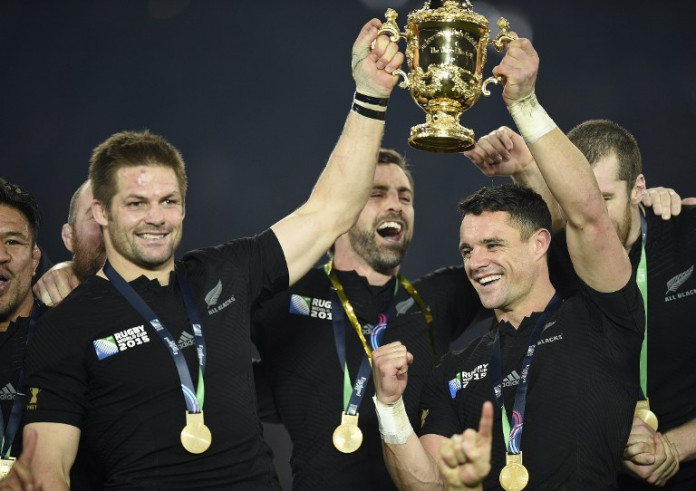
The best World Cup final, after the finest tournament, won by the greatest team.
There are plenty of successful sporting sides. More than a few have established dynasties. Only the rarest both triumph repeatedly and do so with the sort of style and swagger that lights up future generations as well as their own.
This All Blacks team, like the Brazil side that won football’s World Cup in 1970, are now at that sanctified level: drawn from a rich heritage unlike any other, taking their sport to heights that none before have touched.
It is not simply that with Saturday night’s 34-17 win over Australia they have become the first team in history to retain the Webb Ellis trophy.
In winning their World Cup for a third time, just as Brazil did with Pele, Carlos Alberto, Jairzinho and the rest almost half a century before, they have both a cluster of superstars who will still be cherished another 50 years on and a blend that no-one who has seen will ever forget.
Twickenham witnessed both. The opening try from Nehe Milner-Skudder was a collective sleight of hand and sorcery that no other team could have conjured up: Conrad Smith’s step into space only he had seen, Aaron Smith on his inside by instinct, captain Richie McCaw with black-shirted magic to find his young winger outside.
The second, garlanding the start of the second half just as the opener had illuminated the end of the first, exemplified the same unholy skills in a contrasting style: Sonny Bill Williams sucking in three defenders with brute power before off-loading with delicate dexterity, Ma’a Nonu curving away on a wrecking-ball’s path through the splintering defensive wall.
Then, because Australia’s remarkable fightback meant they had to win it a second time, the kingpin could stand out once again.
Dan Carter may have a World Cup winner’s medal from 2011 but it was a consolation rather than coronation, his injury in the pool stages turning poster-boy into water-carrier come the knock-out stages.
His first final, in the last of his 112 Tests for his country, began with violence: Wallaby loose-head prop Scott Sio smashing him back with a late hit to the ribs, Wallaby tight-head Sekope Kepu tickling that pretty jaw with a strong-arm up top. No spoilers, but the original Get Carter does not end well for the script’s eponymous hero.
This time the main man would not be denied. His peerless place kicking had helped establish the 21-3 lead which seemed to have secured the world title once again. When the Wallabies turned that around in 11 second-half minutes through David Pocock and Tevita Kuridrani, his boot then took it back.
First there was the control when all around was chaos: the right options with hands and voice in his own half, a huge clearing kick into opposition territory to still the Aussie advance.
Then the critical kicks. In his first 110 Tests Carter landed a total of just six drop-goals. In the last week he has added two more, the first to put away South Africa in the semi-finals, the second to drive a knife into the twitching Wallaby corpse.
Forty metres out, struck with a same sweet precision as if he were back in the field at his parents’ house in sleepy Southbridge, taking aim at the homemade posts his father stuck up to save any more windows in the house from being smashed.
Then, five minutes later, a penalty from further out still. That he converted Beauden Barrett’s breakaway try at the death with his less favoured right foot was remarkable less for the skill of it and more for the fact that it may have been the first self-indulgent act of his 12 and a half years in an All Blacks jersey.
Because this is Carter, surely the finest fly-half the world has seen, he also made more tackles than any other player from either side. Because of all he has given the game, because of the heartbreak of missing out on his home patch four years ago, this was a redemption both sweet and impossible to resist.
It was a conclusion in fitting with what had come before. The last seven World Cup finals have brought 11 tries, the last three just four.
In 40 minutes on Saturday we had five, the pace unrelenting and the patterns exhilarating. Between them the two sides made a unprecedented 916m with ball in hand, beating 42 defenders and making 18 clean breaks.
That Australia came up short in a contest so significant will leave them nursing spiritual hangovers long after the physical ones have passed, but without their inspiring second-half renaissance this would not have been the unforgettable final it was, just as without their buccaneering displays on consecutive weekends on this ground this tournament would have been so much poorer.
A year ago, coach Michael Cheika installed two days before a northern hemisphere tour on which they would lose three of four matches, one of them to a Scotland side shortly to finish bottom of the Six Nation, the Wallabies being four points from parity with 16 minutes left in a World Cup final seemed as likely as the Southern Cross appearing in a northern sky.
They came close. But this was a night for those in black to shine, just as it has been so often over the past six years, even if Steve Hansen, the coach who has masterminded it all, is so self-effacing that he was the last man onto the victory podium and hidden away behind all his players when the old gold pot was hoisted.
Thirty nine tries in six and bit weeks and seven victories. 1,339 caps in the starting XV. Two World Cups in two attempts, after 24 long years of waiting and missing and falling short.
In the international retirements of so many greats – Carter, presumably McCaw, Nonu, his foil at centre Smith, the grizzled warriors Keven Mealamu and Tony Woodcock – there should be sadness.
Instead, as the fireworks exploded into the dark south-west London night and the golden ticker-tape fell from the skies, there could be only celebration – of a team like no other, of a group of players who have made excellence seem easy.















